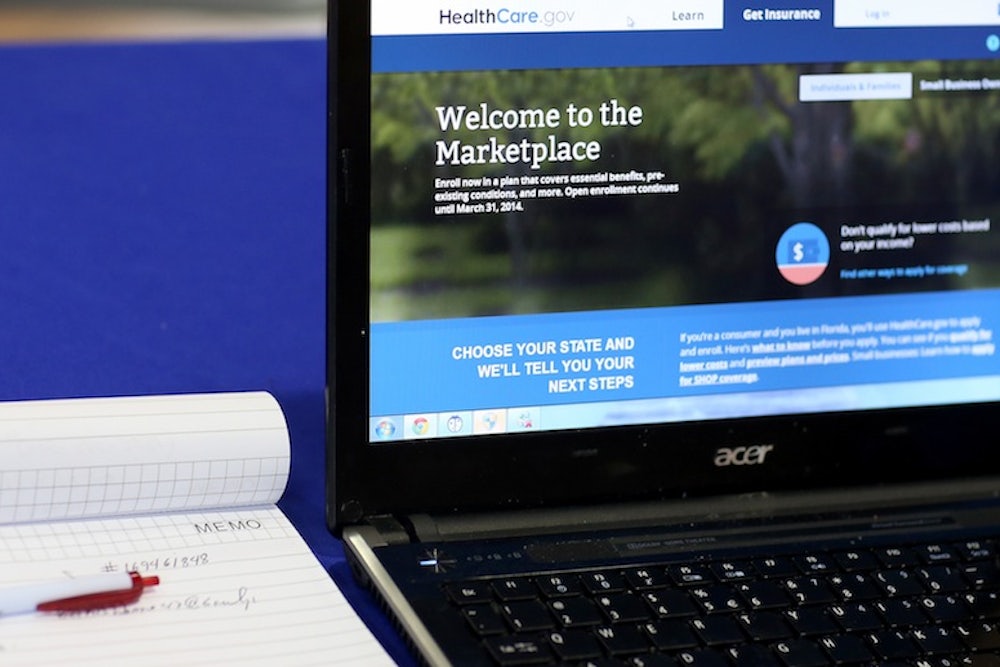Obamacare has gotten some good press lately. And appropriately so. Studies show the number of people without health insurance has dropped significantly. The overall cost of health care continues to rise at one of the slowest rates in memory. In the big ways that matter most, the law is working like it’s supposed to work.
But that doesn’t mean everything is hunky-dory. Implementation remains very much a work in progress, with plenty of glitches and challenges. One in particular could cause some real problems next year.
Allow me to explain. If you get insurance through one of the Affordable Care Act’s new marketplaces, you’ll have the opportunity to “auto-renew” when it comes time to pick a policy for 2015. If your income hasn’t changed, if you want to keep the same insurance policy you have now, and if that policy is still available, you’ll be able to do so without going back through the full enrollment process.
The idea is sensible enough. The main goals of auto-renewal are to make life simple for people who like the insurance they already have through healthcare.gov—and to spread coverage as widely as possible.
But there’s a catch, as Sam Baker explained in a great article for National Journal on Tuesday. To simplify a bit, some people who opt for auto-renewal will discover, months later, that their effective insurance premiums (once they factor in the government’s tax credits) are different than they had expected. Some will actually be getting refunds, while others will owe extra money. It’s not clear exactly how many people will end up in each category. Probably the numbers will be small. But nobody seems to know for sure and at least some people could really struggle with unexpectedly high bills.
The key to solving this problem is education and outreach. The Administration has to make sure consumers understand their situations when they first choose next year’s plans. Many will have to go back to healthcare.gov, so that they can find out exactly what policies are available next year and how much financial assistance, if any, they are entitled to get. These people may be glad they checked, because of the savings they can realize. But they’ll have to make the effort to shop and they’re not going to do that if nobody tells them.
Can the Administration get that message across? Can it make the relevant information easy to find? Its performance leading up to last year’s open enrollment period doesn’t exactly inspire confidence. But the Department of Health and Human Services is under new management, while the Administration as a whole has a great deal more experience when it comes to running a large health care program. Let’s hope they’ve learned a thing or two.
—Jonathan Cohn
The latest policy-related news:
ECONOMICS: The White House is trying to figure out whether, and how, President Obama can use executive authority to stop corporations from transferring operations overseas in order to avoid taxes. (New York Times)
DISASTERS: The House left for recess without voting for additional wildfire funding. Like the Forest Service warned, it is about to run out of money. That means it must dip into its wildfire prevention program. (Associated Press)
NATIONAL SECURITY: Nearly 40 percent of the people on the U.S. government's “known or suspected terrorists” list actually have no known connection to terrorist groups. (Jeremy Scahill and Ryan Devereaux, The Intercept)
Also worth reading:
Some explaining to do:Greg Sargent points out that three of the states where Obama is making the biggest difference happen to be states with tightly contested Senate races. (The Plum Line)
When law enforcement is unlawful: Jamelle Bouie says that incidents like the New York officer choking a person to death are inevitable under “broken windows” policing. And the victims are black and Latino New Yorkers. (Slate)
Something you don’t see every day: The president of a small Kentucky university took a major pay cut, so that low-wage employees could get a raise. (Alan Pyke, ThinkProgress)
The Wild West: Some people still see the Bureau of Land Management as an “occupying army. ” (John Glionna, Los Angeles Times)
Stories we’ll be watching
Not much comes to mind, except ongoing stories like immigration. So far, it’s been a slow news week for domestic policy.
What’s new at QED
Chinese officials announced their intention to ban the use of coal in Beijing. Rebecca Leber figures out what it means for the people who live there—and for the future of international climate change negotiations. Also, check out the map and graph breaking down Obamacare's progress by state. Turns out that it's reaching many more of the uninsured in states where officials have tried to implement the program in good faith. Yeah, quite the shocker.
